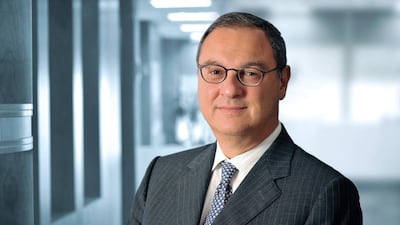In the first of an occasional series, Sabah Al Binali, whose regular column appears in our pages each Tuesday, writes together with a regional business leader who shares the benefits of their experience.
Anthony Mallis, the chief executive of Securities & Investment Company (Sico) of Bahrain between 2001 to 2014, grew a boutique brokerage company into a regional asset management powerhouse. (Tony is humble in his accomplishments and all promotion of his accomplishments is attributable solely to his co-author.)
Mr Mallis was hired to a challenging assignment; turn around or close a money-losing entity that was caught short by the GCC market malaise of the late ‘90s. In 2001 the GCC and Mena capital markets were still nascent, with the Gulf still affected by low oil prices and mid-’90s collapsed share prices.
Locally, commercial banks had little interest in the domestic capital markets, focusing on deposit-gathering, the local retail markets and pushing third-party foreign investment products to their clients. The small number of local investment banks had a largely real estate focus, or were parochial when it came to regional investments – focusing on their domestic markets for both clients and proprietary activities.
Mr Mallis had to think out of the box if he was going to succeed in his mandate. The first and more immediate problem to solve was how to bring the company back to profitability, and secondly creating a balanced revenue stream combining elements of stable annuity income and more volatile, but more profitable, trading revenues for the longer term. The firm had adequate capital for a domestic investment firm. What was lacking was a focus, Bahrain being the smallest GCC economy, and finally a competitive advantage.
Due to its ownership structure, divided between 11 institutional shareholders – nine commercial banks and two pension funds – the firm had to remain an independent boutique firm. This was fine with Mr Mallis, believing that this gave him room to manoeuvre and experiment. He could selectively and in extremis call on his shareholders, but in actuality kept them at arm’s length. Understanding that a boutique firm lacked “brawn” but should compensate with “brains and nimbleness”, Mr Mallis needed to discern a strategy that gave his bank a competitive edge.
He came up with five strategic points:
The weakness of his competitors at that time was their national, as opposed to regional, focus. So he decided to refocus the firm to have a purely GCC dimension.
Commercial banks had their greatest strength in catering to retail clients via their branch network, but an undeveloped institutional-targeted culture. Investment boutiques on their shareholder base. Therefore concentrating on institutional clients with a best-in-class service and performance would be the differentiating factor.
Internally, focus on superior quality of service by weeding out the less than optimal human resources, and converting the promising resources into specialised units, eg converting the sell-side research unit into an equity asset management unit; introducing an omnibus brokerage account that gave clients access to all GCC stock markets through one account; breaking silos within the small firm where everybody had a success in the company, etc.
Understand that when the financial services sector in the GCC and the wider Middle East developed, it would be in a manner not easily forecast, so a flexible approach would be imperative.
The firm would have the highest ethical and governance values, with a robust risk management culture.
To understand how daring it was to think regionally in 2001, one has to remember that the region was just coming out of a low oil price recessionary environment, heading towards a third Gulf war, and an equity market that was not only underdeveloped but also purely retail- oriented.
Just as important to thinking regionally was Mr Mallis’s ability to not only retain the bulk of the team inherited but recruit top talent to the company.
Sico was organised on four business lines: brokerage, asset management, corporate finance and a proprietary desk that managed the firm’s capital.
With a core team and a core service in place, Mr Mallis then began with his new teams visiting potential institutional clients. Unlike many of his peers, he understood that he could not predict when clients would come on board, or the markets would turn, with costs – the only constant a manager could control – throughout his tenor were managed tightly. The best way to do that? By example. As other CEOs travelled first class or even by private jet, Mr Mallis flew economy. While company premises were to be comfortable, nothing fancy was sought. Salaries were performance-based but not over-generous, bonuses, on the other hand, were market-based and not immodest. The understanding was that savings would be shared by all stakeholders at year-end.
Additionally the firm instituted clear guidelines that created transparency and “best practice” for their clients, and in particular any error on any team’s part was clearly communicated to clients and fully compensated.
Although that strategy could have been ignored because of the raging bull market, instituting such policies paid long- term dividends especially during the 2008 global crisis, during which clients abandoned nearly every investment bank other than Sico.
By the same token, Sico looked after its employees. Unlike their peers, there was very little employee turnover at Sico during the difficult times. This was not because Mr Mallis blindly held on to his employees. It was because he never over-hired during the good times, which meant that when the hard times came there was not fat to cut.
Taking charge of a local brokerage firm and building it up into a successful regional investment bank is a testament to the visionary CEO, his dedicated and hard- working team and not least a board of directors that supported him on his mission.
You can read more from Sabah Al Binali at al-binali.com
Follow The National's Business section on Twitter

